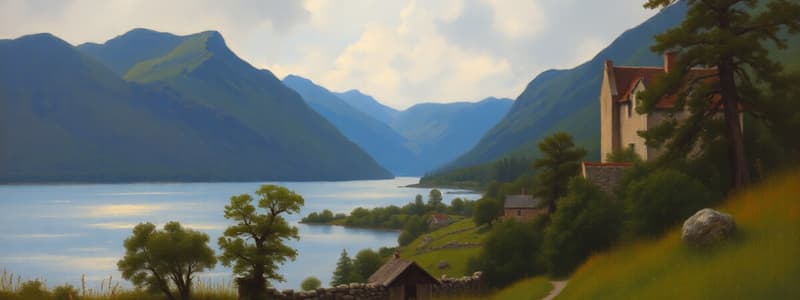Podcast
Questions and Answers
What was the primary language spoken in the Scottish Highlands during the 10th to 17th centuries?
What was the primary language spoken in the Scottish Highlands during the 10th to 17th centuries?
What factor led to the unification of the Scottish population during the Wars of Independence?
What factor led to the unification of the Scottish population during the Wars of Independence?
Which statement about the Picts is accurate?
Which statement about the Picts is accurate?
How did the clans in the Scottish Highlands primarily organize themselves?
How did the clans in the Scottish Highlands primarily organize themselves?
Signup and view all the answers
What was the main cause of the War of Independence against England?
What was the main cause of the War of Independence against England?
Signup and view all the answers
What event secured Scottish independence?
What event secured Scottish independence?
Signup and view all the answers
What was the outcome of the Scottish Act of Union in 1707?
What was the outcome of the Scottish Act of Union in 1707?
Signup and view all the answers
What did the Scots primarily oppose during the reign of Charles I?
What did the Scots primarily oppose during the reign of Charles I?
Signup and view all the answers
Which factor contributed to the weakening of Scottish political autonomy?
Which factor contributed to the weakening of Scottish political autonomy?
Signup and view all the answers
What was one of the key features retained by Scotland after the Act of Union?
What was one of the key features retained by Scotland after the Act of Union?
Signup and view all the answers
What symbol of Scottish identity faced suppression after the Battle of Culloden?
What symbol of Scottish identity faced suppression after the Battle of Culloden?
Signup and view all the answers
What was a significant consequence of the Jacobite uprisings?
What was a significant consequence of the Jacobite uprisings?
Signup and view all the answers
Who were the Catholic Stuart pretenders that the Highlanders aimed to restore to the throne?
Who were the Catholic Stuart pretenders that the Highlanders aimed to restore to the throne?
Signup and view all the answers
Study Notes
Early Scotland (5th-10th Centuries)
- Britain and Ireland were inhabited by Celtic people during the Roman Empire.
- Romans conquered the southern part of the island, creating the province of Britannia.
- Scotland was never part of the Roman Empire, inhabited by barbarian tribes like the Picts.
- Anglo-Saxon invaders occupied England and much of the Scottish lowlands, pushing Celts southwest.
- Celtic people from Ireland (Scots) migrated to the Highlands.
- Picts and Scots intermingled.
- By the 9th century, the Picts and Scots united into a kingdom.
Highlands vs. Lowlands (10th-17th Centuries)
- Highlands: Predominantly spoke Scottish Gaelic, inheriting Celtic traditions from the Scots who migrated from Ireland. Rural and agricultural. Organized around clan alliances (loyalty based on kinship or community), not always blood relatives, distinguished by tartan. Kilts (men's woolen skirts), and "Mc" or “Mac" names, denoting "son of."
- Lowlands: Predominantly spoke a Northern English dialect. Became known as Scots. More foreign settlers, feudalism took root earlier, and towns/cities flourished with more trade and industry.
Wars of Scottish Independence (1296-1314)
- Scotland's population united against England in wars of independence.
- Disputes over royal succession (following the death of the Scottish royal dynasty) were the main trigger.
- King Edward I of England sought to incorporate Scotland into his empire.
- National heroes and martyrs emerged (William Wallace, Robert the Bruce).
- Robert the Bruce's victory at Bannockburn secured Scottish independence.
Personal Union of England and Scotland (1603-1707)
- Queen Elizabeth I's death led to King James VI of Scotland inheriting the English throne (now King James I of England).
- Scotland adopted Presbyterianism during this period.
- Stuart monarchs ruled from London, gradually shifting political and economic power to England.
- Scotland fought against King Charles I when he attempted to reform the Scottish Church.
- Scots supported Charles I against English Parliament during the Civil War.
- Oliver Cromwell's defeat of the Scots resulted in English military occupation until 1660, weakening Scottish autonomy.
Act of Union and Jacobite Uprisings (1707-1745)
- The Act of Union in 1707 united England and Scotland forming Great Britain.
- The Scottish Parliament was dissolved and replaced with Scottish MPs in the British Parliament.
- Scotland retained distinct institutions, like its legal and education systems and the Presbyterian Church of Scotland.
- Jacobite risings (1715 and 1745-46) were the last wars against England in the Highlands to restore Catholic Stuart pretenders (sons and grandsons of James II).
- The 1746 Battle of Culloden resulted in suppression of local practices and forced assimilation into English culture.
- Highland traditions, like kilts, tartans, bagpipes etc, became symbols of Scottish history.
- Clan systems collapsed.
- Emigration of Scots.
Studying That Suits You
Use AI to generate personalized quizzes and flashcards to suit your learning preferences.
Description
Test your knowledge on the fascinating history of early Scotland from the 5th to 10th centuries, including the impact of the Roman Empire and the integration of Celtic tribes. Explore the distinct cultures of the Highlands and Lowlands during the 10th to 17th centuries. This quiz is perfect for those interested in Scottish history and its cultural evolution.




